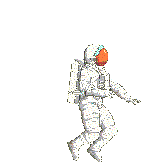 Our Solar System Scavenger Hunt
Grade Three
For Lesson Information Click Here
Let's take a journey through space and explore our solar system! Grab your space suit; it's time for the countdown.
Five, Four, Three, Two, One.......BLASTOFF!

Answer the following questions on your journey. Use the internet links to help you! And, have a safe trip!
Question #1:List the planets in order, starting from the planet closest to the Sun.
http://en.wikipedia.org/wiki/File:Planets2008.jpg
Question #2:Which planet is closest to the Sun and how hot is it there (in Fahrenheit)? Do you think that humans could live there? Why or why not?
http://www.enchantedlearning.com/subjects/astronomy/planets/
Question #3:What causes day and night on planet Earth?
http://www.woodlands-junior.kent.sch.uk/time/index.html
Question #4:How long does it take for the Earth to make one full rotation?
http://www.woodlands-junior.kent.sch.uk/time/index.html
Which direction does it turn?
http://kids.nineplanets.org/intro.htm
Question #5:How fast does the Earth rotate? Can we feel it spin?
http://content.scholastic.com/browse/article.jsp?id=4841
Question #6:What causes the four seasons (spring, summer, autumn, winter) on planet Earth?
http://www.woodlands-junior.kent.sch.uk/time/seasons.htm
Question #7:How long does it take for the Earth to orbit the Sun? How many times has the Earth orbited the Sun during your lifetime?
http://www.classzone.com/
(Click on play to watch the Earth orbit the Sun.)

Question #8:Draw and label the phases of the moon. Why do we see the phases of the moon?
http://www.coldwater.k12.mi.us/lms/planetarium/guide/moon.html
Question #9:What characteristics of Earth make it livable for human beings?
http://www.kidsastronomy.com/earth.htm/
http://www.faqkids.com/idx/4/018/?lore_sid=6f06bfaae137f7a0d957b518919aee85
Essential Question #10:If you could choose another planet to live on besides Earth, which would you choose and why? Include facts from
the following website (click on the different planets):
http://www.kidsastronomy.com/solar_system.htm
Congratulations! You made it! Great Work!

Thanks for taking a journey through the solar system with us! We hope you enjoyed the ride!
|
|